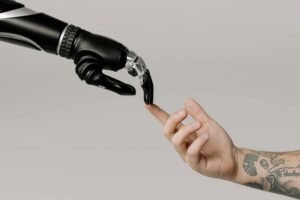What is Artificial Intelligence
Artificial Intelligence refers to machines that show human-like thought and learning abilities.
AI is the process by which computers or machines perform similar tasks to how humans use our brains to solve problems, learn new things, or communicate with others.
- AI is when you ask a question of Alexa or Siri and it responds.
- YouTube uses artificial intelligence to recommend videos that you might find interesting.
- AI is also used when your phone unlocks with your face!

💡 What Can AI Do?
Artificial Intelligence helps machines:
- Gain knowledge from data, just as we do from experience.
- Know how to communicate (write or speak)
- Observe and identify objects or faces.
- Make choices, such as selecting the best action to make in a game.

📱 Where Do We Use Artificial Intelligence?
You see AI in:
- Smartphones (face unlock, voice assistants)
- Using Google Maps to find fastest way
- Social media ( showing content you may find interesting)
- online ordering (suggestions)
- Automatic cars
-
-
🎓 Types of Artificial Intelligence (Very Basic):
-
Narrow AI – Capable of only one thing, such as language translation.
-
General AI – While we don’t yet have it, it is intelligent in many ways like a human.
-
Super AI –More intelligent than humans (this is science fiction, for now).
🤔 Why Is AI Important?
-
Time is saved.
-
It can perform boring or hard duties.
-
It supports farming, education, healthcare, and other fields.
-
Of course, we must use it responsibly and safely.
-
⚖️ Is AI Good or Bad?
AI is like a tool — it depends on how we use it.
✅ Good Uses:
-
Helping healthcare workers in the identification of diseases
-
Using smart devices to help blind people “see”
-
Increasing productivity of farming

-
-
❌Issues:
-
Taking over some jobs
-
sharing deepfakes, or fake videos
-
Issues about privacy
That’s why it’s important to use AI carefully and responsibly.
🧠 Popular Branches of AI
Here are some areas within AI you may have heard about:
-
Machine Learning (ML) – AI that learns from data
-
Deep Learning – ML using artificial neural networks (like how the brain works)
-
Natural Language Processing (NLP) – AI that understands human language (like ChatGPT)
-
Computer Vision – AI that “sees” and understands images and video
-
Robotics – AI that controls physical robots or machines
💬 Is AI Replacing Humans?
Yes, This is a common fear. While AI can automate many tasks, it doesn’t mean it will take over all jobs. Instead, AI is more likely to:
-
Replace repetitive tasks
-
Create new kinds of jobs
-
Help humans work faster and smarter
But we do need to prepare for changes — especially in education, skills, and how we work.
⚖️Is There Any Risk Of AI?
Ethics and Risks of AI
AI is strong. It is already improving daily life, resolving major issues, and changing industries. However, huge authority also carries a great deal of responsibility.Powered by licensed brokers and built for compliance—your capital stays protected opulatrix guide. As AI becomes advanced and common, we need to consider:
-
Is AI fair?
-
Is it safe?
-
Can it be trusted?
-
Who controls it?
In simple words, let’s examine the risks and ethical issues surrounding AI.
AI also raises significant ethical concerns.
-
Is AI able to be unfair or biased?
-
If AI makes a mistake, who carries the blame?
-
Should AI be able to make decisions that could mean the difference between life and death?
-
How can we protect AI?
To ensure that AI is used responsibly, governments and businesses are working on regulations and safety measures.
🧠 What Are AI Ethics?
AI ethics is about making sure that AI:
-
Is used fairly
-
Respects human rights
-
Doesn’t harm people
-
Is transparent and accountable
In other words, ethics helps guide how AI should be used, not just what it can do.
🚨 Top Risks & Ethical Issues of AI
1. Bias and Discrimination
AI learns from data — but if the data is biased, the AI will be too.
Example:
An AI may learn to favor men over women even if it isn’t instructed to do so if it is trained on hiring data that shows an increase of men being hired.
👉 Why it matters: AI may accidentally treat individuals unfairly on the basis of their age, gender, race, and other characteristics.
2. Loss of Jobs
Certain jobs, particularly repetitive or routine ones, may become useless as AI automates tasks.
Example:
-
Self-checkout replaced cashiers.
-
Chatbots have replaced customer service.
👉 Why it matters: Millions of people, particularly in nations that are developing, may need to change careers or retrain.
3. Privacy Concerns
AI frequently uses personal information, such as location, images, search history, and even audio recordings, to inform its decisions.
Example:
-
People are being tracked in public by face recognition.
-
Artificially intelligent listening (similar to smart speakers)
👉 Why it matters: People can no longer be in charge of their own information and privacy.
4. Misinformation and Deepfakes
Artificial Intelligence can now create realistic fake videos, images, and news — known as deepfakes.
Example:
-
A politician is seen in a fake video saying something they never said.
-
Fake news articles created by Artificial inteligence
👉 Why it matters: This has the potential to spread false information, shape elections, or even create fear.
5. Lack of Accountability
If AI makes a bad decision, who’s responsible? The creator? The user? The machine?
Example:
If a self-driving car crashes, who gets blamed?
👉 Why it matters: We need clear rules on who is accountable for AI decisions.
6. AI Weaponization
AI can be used intentionally by governments and organizations for things like cyberattacks, tracking, and self-learning weapons.
👉 Why it matters: This raises questions about warfare ethics, safety, and international control.
7. Loss of Human Control
Advanced AI systems may make decisions that humans don’t understand — or can’t stop in time.
Example:
-
Flash market crashes caused by Artificial Intelligence stock trading systems
-
Drones that operate autonomously without human consent
👉 Why it matters: “Human-in-the-loop” systems are becoming more and more necessary to maintain control.
8. AI Addiction and Manipulation
AI is used by social media companies to keep users online for longer, even at the expense of their mental health.
Example:
-
Algorithm feeding you endless videos to keep you scrolling
-
recommending split material to increase interaction
👉 Why it matters: Artificial Intelligence can manipulate human behavior for profit, not well-being.
🛡️ How Can We Make Artificial Intelligence Safe and Ethical?
Here are ways experts and governments are working to reduce risks:
✅ 1. AI Ethics Guidelines
-
Many countries and tech companies are creating rules for responsible AI
-
Examples: EU’s AI Act, UNESCO AI ethics framework
✅ 2. Bias Audits
-
Companies are now testing their AI models for bias before release
✅ 3. Transparency
-
Making AI systems explain their decisions (called “explainable AI”)
✅ 4. Human Oversight
-
Keeping humans in control — especially in life-critical decisions (like healthcare or military)
✅ 5. Data Privacy Laws
-
Laws like GDPR (Europe) and CCPA (California) give people more control over their data
✅ 6. AI for Good
-
Encouraging projects that use AI for social benefit — like education, climate, health, and accessibilityhttps://fashionchicheck.com/what-is-artificial-intelligence/